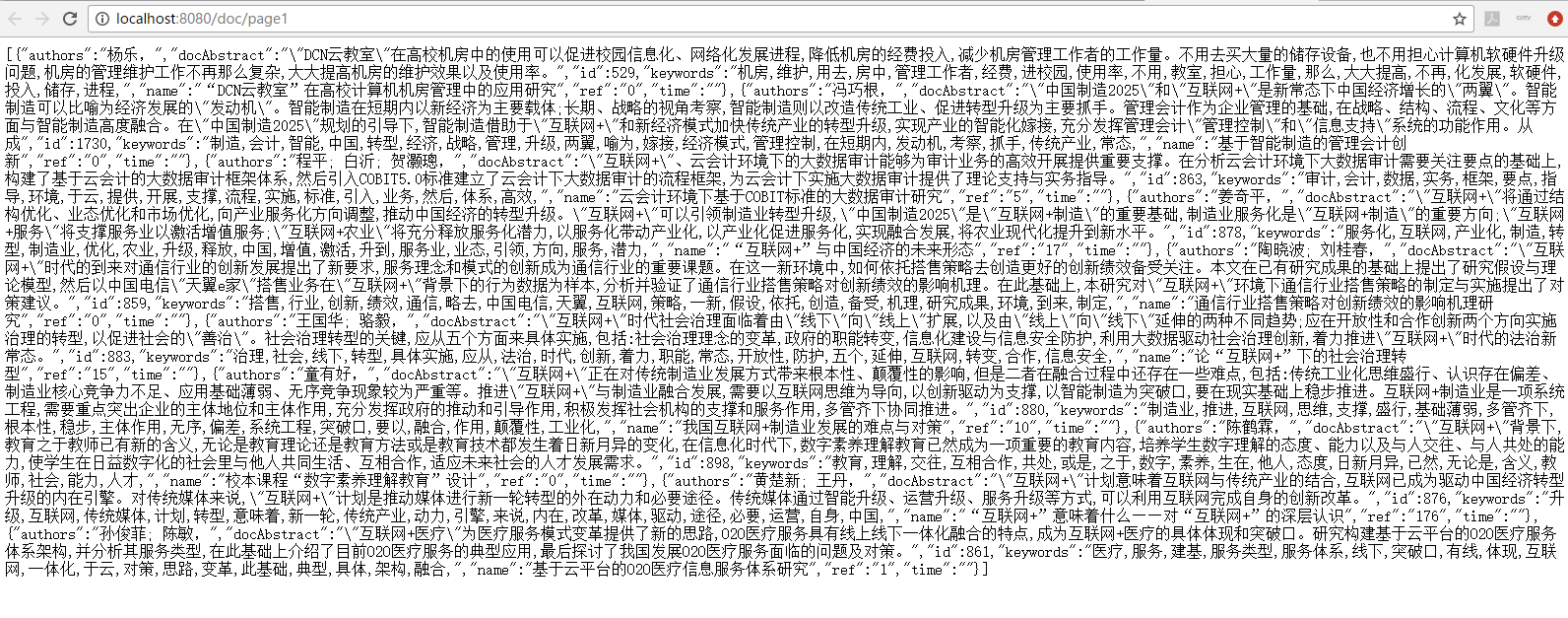https://www.cnblogs.com/ljdblog/p/6725094.html
一个好的讲解mybatis的博客地址http://www.jianshu.com/nb/5226994
引言
对于使用Mybatis时,最头痛的就是写分页,需要先写一个查询count的select语句,然后再写一个真正分页查询的语句,当查询条件多了之后,会发现真不想花双倍的时间写count和select,
如下就是项目在没有使用分页插件的时候的语句
<!-- 根据查询条件获取查询获得的数据量 -->
<select id="size" parameterType="Map" resultType="Long">
select count(*) from help_assist_student
<where>
<if test="stuId != null and stuId != ''">
AND stu_id like
CONCAT(CONCAT('%',
#{stuId,jdbcType=VARCHAR}),'%')
</if>
<if test="name != null and name != ''">
AND name like
CONCAT(CONCAT('%',
#{name,jdbcType=VARCHAR}),'%')
</if>
<if test="deptId != null">
AND dept_id in
<foreach item="item" index="index" collection="deptId" open="("
separator="," close=")">
#{item}
</foreach>
</if>
<if test="bankName != null">
AND bank_name in
<foreach item="item" index="index" collection="bankName"
open="(" separator="," close=")">
#{item}
</foreach>
</if>
</where>
</select>
<!-- 分页查询获取获取信息 -->
<select id="selectByPageAndSelections" parameterType="cn.edu.uestc.smgt.common.QueryBase"
resultMap="BaseResultMap">
select * from help_assist_student
<where>
<if test="parameters.stuId != null and parameters.stuId != ''">
AND stu_id like
CONCAT(CONCAT('%',
#{parameters.stuId,jdbcType=VARCHAR}),'%')
</if>
<if test="parameters.name != null and parameters.name != ''">
AND name like
CONCAT(CONCAT('%',
#{parameters.name,jdbcType=VARCHAR}),'%')
</if>
<if test="parameters.deptId != null">
AND dept_id in
<foreach item="item" index="index" collection="parameters.deptId"
open="(" separator="," close=")">
#{item}
</foreach>
</if>
<if test="parameters.bankName != null">
AND bank_name in
<foreach item="item" index="index" collection="parameters.bankName"
open="(" separator="," close=")">
#{item}
</foreach>
</if>
</where>
order by dept_id,stu_id
limit #{firstRow},#{pageSize}
</select>
可以发现,重复的代码太多,虽然说复制粘贴简单的很,但是文件的长度在成倍的增加,以后翻阅代码的时候头都能大了。
于是希望只写一个select语句,count由插件根据select语句自动完成。找啊找啊,发现PageHelperhttps://github.com/pagehelper/Mybatis-PageHelper 符合要求,于是就简单的写了一个测试项目
1,配置分页插件:
直接从官网上copy的如下:
Config PageHelper
1. Using in mybatis-config.xml
<!--
In the configuration file,
plugins location must meet the requirements as the following order:
properties?, settings?,
typeAliases?, typeHandlers?,
objectFactory?,objectWrapperFactory?,
plugins?,
environments?, databaseIdProvider?, mappers?
-->
<plugins>
<plugin interceptor="com.github.pagehelper.PageInterceptor">
<!-- config params as the following -->
<property name="param1" value="value1"/>
</plugin>
</plugins>
2. Using in Spring application.xml
config org.mybatis.spring.SqlSessionFactoryBean as following:
<bean id="sqlSessionFactory" class="org.mybatis.spring.SqlSessionFactoryBean">
<!-- other configuration -->
<property name="plugins">
<array>
<bean class="com.github.pagehelper.PageInterceptor">
<property name="properties">
<!-- config params as the following -->
<value>
param1=value1
</value>
</property>
</bean>
</array>
</property>
</bean>
我使用第一中方法:
<!-- 配置分页插件 -->
<plugins>
<plugin interceptor="com.github.pagehelper.PageInterceptor">
<!-- 设置数据库类型 Oracle,Mysql,MariaDB,SQLite,Hsqldb,PostgreSQL六种数据库-->
<property name="helperDialect" value="mysql"/>
</plugin>
</plugins>
其余的关于mybatis整合spring的内容就不用提了。
2,编写mapper.xml文件
测试工程就不复杂了,简单的查询一个表,没有条件
<select id="selectByPageAndSelections" resultMap="BaseResultMap">
SELECT *
FROM doc
ORDER BY doc_abstract
</select>
然后在Mapper.java中编写对应的接口
public List<Doc> selectByPageAndSelections();
3,分页
@Service
public class DocServiceImpl implements IDocService {
@Autowired
private DocMapper docMapper;
@Override
public PageInfo<Doc> selectDocByPage1(int currentPage, int pageSize) {
PageHelper.startPage(currentPage, pageSize);
List<Doc> docs = docMapper.selectByPageAndSelections();
PageInfo<Doc> pageInfo = new PageInfo<>(docs);
return pageInfo;
}
}
参考文档说明,我使用了PageHelper.startPage(currentPage, pageSize);
我认为这种方式不入侵mapper代码。
其实一开始看到这段代码时候,我觉得应该是内存分页。其实插件对mybatis执行流程进行了增强,添加了limit以及count查询,属于物理分页
再粘贴一下文档说明中的一段话
4. 什么时候会导致不安全的分页?
PageHelper 方法使用了静态的 ThreadLocal 参数,分页参数和线程是绑定的。
只要你可以保证在 PageHelper 方法调用后紧跟 MyBatis 查询方法,这就是安全的。因为 PageHelper 在 finally 代码段中自动清除了 ThreadLocal 存储的对象。
如果代码在进入 Executor 前发生异常,就会导致线程不可用,这属于人为的 Bug(例如接口方法和 XML 中的不匹配,导致找不到 MappedStatement 时), 这种情况由于线程不可用,也不会导致 ThreadLocal 参数被错误的使用。
但是如果你写出下面这样的代码,就是不安全的用法:
PageHelper.startPage(1, 10);
List<Country> list;
if(param1 != null){
list = countryMapper.selectIf(param1);
} else {
list = new ArrayList<Country>();
}
这种情况下由于 param1 存在 null 的情况,就会导致 PageHelper 生产了一个分页参数,但是没有被消费,这个参数就会一直保留在这个线程上。当这个线程再次被使用时,就可能导致不该分页的方法去消费这个分页参数,这就产生了莫名其妙的分页。
上面这个代码,应该写成下面这个样子:
List<Country> list;
if(param1 != null){
PageHelper.startPage(1, 10);
list = countryMapper.selectIf(param1);
} else {
list = new ArrayList<Country>();
}
这种写法就能保证安全。
如果你对此不放心,你可以手动清理 ThreadLocal 存储的分页参数,可以像下面这样使用:
List<Country> list;
if(param1 != null){
PageHelper.startPage(1, 10);
try{
list = countryMapper.selectAll();
} finally {
PageHelper.clearPage();
}
} else {
list = new ArrayList<Country>();
}
这么写很不好看,而且没有必要。
4,结果
controller层中简单的调用然后返回json字符串如下:可以看出,结果基于doc_abstract排序后返回1-10条的数据

结语
尽量不要重复造轮子。
